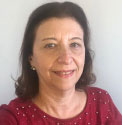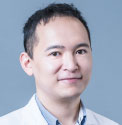We asked ACARE centers from our Asia Pacific, Americas, and EMEA regions to tell us a little about their journey. This time, we hear from Professor Anete Grumach, University Centre FMABC Medical School in Brazil; Dr. Philip Li, Queen Mary Hospital, Hong Kong; and Ms. Lorena Lorenzo, Lead Immunology Clinical Nurse Specialist, from Bart’s Health NHS Trust, United Kingdom.
 Questions answered by Ms. Lorena Lorenzo RN, INP, Lead Immunology Clinical Nurse Specialist from Bart’s Health NHS Trust. Ms. Lorenzo holds a BSc Degree in Nursing and is a qualified Independent Nurse Prescriber. She authored the recently published Nurse Competencies for Nurse-led HAE and CSU clinics, which forms part of the Immunology Nursing Competency Framework for UK nurses.
Questions answered by Ms. Lorena Lorenzo RN, INP, Lead Immunology Clinical Nurse Specialist from Bart’s Health NHS Trust. Ms. Lorenzo holds a BSc Degree in Nursing and is a qualified Independent Nurse Prescriber. She authored the recently published Nurse Competencies for Nurse-led HAE and CSU clinics, which forms part of the Immunology Nursing Competency Framework for UK nurses.
What benefits have you experienced since becoming an accredited ACARE center? Being an ACARE member has opened the doors for collaborative opportunities with other accredited institutions, creating a network for sharing knowledge and best practices internationally. ACARE membership provides access to additional resources, including preceptorship training, podcasts, and webinars about recent improvements in diagnosis, management, and treatments in HAE and chronic spontaneous urticaria (CSU). This access can lead to advancements in treatment options and a better-equipped staff for a better patient experience. Being a member presents an opportunity to participate in several projects, audits, research, and development to improve patient care. As a center for reference and excellence, it promotes and encourages commitment to continuous improvement by staying updated with the latest research. And lastly, it comes with increased credibility and recognition in the global HAE community.
How has care improved for your patients since you became an accredited ACARE center? Since Bart’s Health became an accredited center, we have adopted an enhanced patient-centered approach. We have incorporated the use of PROMs (patient-reported outcome measures) and specific questionnaires in our routine consultations to highlight patient’s needs in relation to the burden of the disease and treatment. In this way, our patients take an active part in decision-making regarding the overall management of their condition, resulting in increased patient satisfaction.
What advice would you give to a hospital or clinic considering applying to become an ACARE center? I encourage aspiring centres to start by looking at the 32 ACARE standards. During this process, it will highlight the existing level and quality of service. The journey towards accreditation is an opportunity to look into the gaps in the service and identify areas for change. The accreditation exercise will encourage your team to work together to improve operational efficiency and processes. This can lead to more comprehensive treatment plans and better outcomes for patients. Ultimately, it will reassure you, knowing that compliance with the set standards provides a solid foundation for your service, ensuring that service is high-quality, safe, and ethical.
What has becoming an accredited ACARE center enabled you to achieve? As an ACARE center, we have established ourselves as the hub of high standards of practice and quality of service in managing HAE in the UK. It has expanded our patient cohort and research portfolio. Bart’s Health Angioedema Center currently provides the largest HAE service and the only ACARE-accredited NHS service in the UK. We have approximately 200 patients (adult, adolescent, and pediatrics combined). We have ongoing clinical trials at national and international levels, including novel therapeutics. Our clinicians have leadership in clinical networks, patient organizations, and training. We can provide home therapy for all therapeutics within the specialty. The accreditation process has helped us streamline our operations, improve the quality of care, and build trust with patients and the HAE community. This further motivates us to improve our performance and patient safety.
 Questions answered by Professor Anete Sevciovic Grumach, Professor of Clinical Immunology and coordinator of the University’s Center for Rare Diseases. Professor Grumach is also President of Honor and Founder of GEBRAEH, the Brazilian group of HAE researchers and physicians.
Questions answered by Professor Anete Sevciovic Grumach, Professor of Clinical Immunology and coordinator of the University’s Center for Rare Diseases. Professor Grumach is also President of Honor and Founder of GEBRAEH, the Brazilian group of HAE researchers and physicians.
What benefits have you experienced since becoming an accredited ACARE center? What needs to be emphasized is the recognition of being capable of diagnosing and treating HAE patients. Additionally, as an ACARE, we have the opportunity to exchange experiences with other centers all over the world.
How has care improved for your patients since you became an accredited ACARE center? We have been working to provide modern therapies to our patients. Belonging to a group with the same aims helped us be representative and heard by our health entities.
What advice would you give to a hospital or clinic considering applying to become an ACARE center? I encourage all the HAE centers with a particular interest in collaborations to submit their centers to be an ACARE. Several projects are going on, and the opportunity to improve awareness and knowledge about angioedema is invaluable.
What has becoming an accredited ACARE center enabled you to achieve? It isn’t easy to pinpoint one aspect. However, participating in preceptorships, specific symposia or discussions has certainly improved our support to patients. In addition, I am sure that including our Center in projects and clinical research represents a huge benefit to all of us.
 Questions answered by Dr. Philip H Li, Specialist in Immunology and Allergy and Clinical Assistant Professor at the University of Hong Kong. Dr. Li serves as Chief of the Division of Rheumatology & Clinical Immunology of the Department of Medicine. He is also the Vice President of the Hong Kong Institute of Allergy and a Board Director of the Asia Pacific Association of Allergy, Asthma and Clinical Immunology.
Questions answered by Dr. Philip H Li, Specialist in Immunology and Allergy and Clinical Assistant Professor at the University of Hong Kong. Dr. Li serves as Chief of the Division of Rheumatology & Clinical Immunology of the Department of Medicine. He is also the Vice President of the Hong Kong Institute of Allergy and a Board Director of the Asia Pacific Association of Allergy, Asthma and Clinical Immunology.
What benefits have you experienced since becoming an accredited ACARE center? It has put us in close partnership and collaboration with other ACARE centers in Asia Pacific and beyond. It has also given our patients, staff, and peers more recognition and confidence. Becoming an ACARE is proof that our center really does strive to continuously improve ourselves when caring for our HAE patients.
How has care improved for your patients since you became an accredited ACARE center? Through collaboration with ACARE, we have worked with other centers to devise new strategies and share experiences in HAE management. One example is our recent publication – working with colleagues in India – of using high C1-INH levels as a screening method for Type II HAE patients!
What advice would you give to a hospital or clinic considering applying to become an ACARE center? The scale of the accreditation criteria might seem overwhelming at first, but it is worth the effort! The standards set to join ACARE helped push our center to improve further. Just the preparation and process of applying helped us take a step back to review our center’s progress and achievements and restructure ourselves and our strategies.
What has becoming an accredited ACARE center enabled you to achieve? We have joined other ACARE centers in working towards an Asia Pacific HAE Consensus Statement, as well as establishing an upcoming new Asia-focused collaboration we call: ‘HAE-ASIA (Angioedema Screening Initiative in Asia).’










